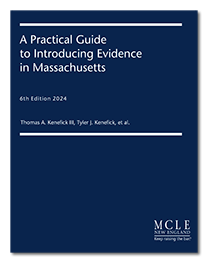A Practical Guide to Introducing Evidence in Massachusetts
Trusted guidance for every stage of your trial

- Product Number: 1870081B00
- Publication Date: 7/8/2024
- Edition: 6th Edition 2024
- Copyright: © 2024 MCLE, Inc.
-
Add to Favorites List
Choose Format:
Pricing: $195.00; Members: $175.50; New Lawyers: $97.50
Add to Cart
Member and new lawyer discounts applied in cart.
Also Available:
eArticles
See Table of Contents below to purchase individual chapters from this book.
Your purchase includes the chapter's exhibits (if any). Pricing varies by page count.
Member and new lawyer pricing available.
Free for OnlinePass subscribers.
eChecklists and eForms
See Table of contents below to purchase individual checklists and forms from this book.
Pricing varies by exhibit type. Member and new lawyer pricing available.
Free for OnlinePass subscribers.
-
Product Description
Product Description
A Practical Guide to Introducing Evidence in Massachusetts is a convenient reference for identifying the foundational requirements and examination techniques that apply to introducing evidence at trial. Sample examinations illustrate the practical implementation of each of the evidentiary approaches explored in the text.
The Practical Guide addresses some eighty evidentiary areas, from admissions to X-rays. And it offers tips and guidelines for handling established categories of evidence—prior convictions, privileges, hearsay—as well as timely topics such as genetic marker testing, "first complaint" evidence, Daubert/Lanigan standards, and electronic evidence such as Web pages and e-mail.
Recent updates:
- Update: July 2024
- Table of Contents
- Editors & Authors


